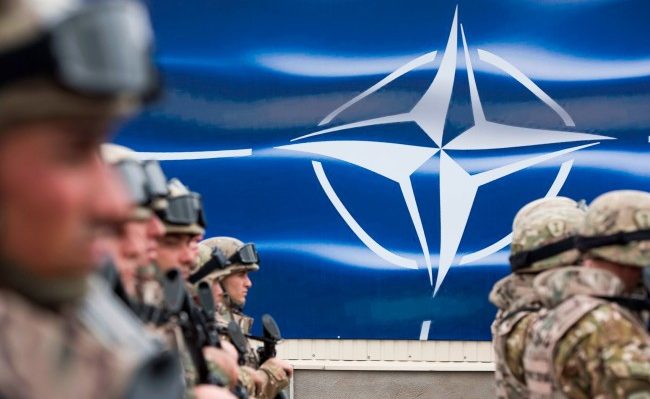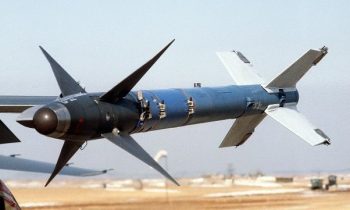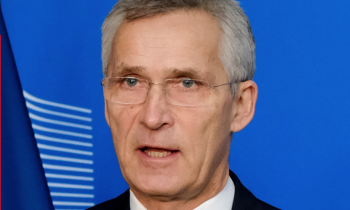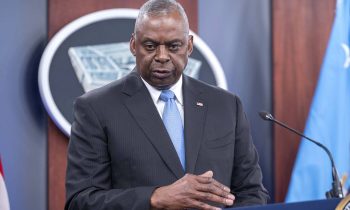A senior defense official, who declined to be quoted on the record, told reporters Wednesday that European security still depends on the transatlantic alliance and that any capabilities that are developed within non-NATO European contexts, whether that be EU or otherwise, needs to be compatible and non-duplicative with NATO. PESCO Initiatives, which is really the Military Mobility Initiative that is one of our foundational projects within Europe, is moving forward in a way that’s consistent with NATO requirements and capabilities, and therefore good for both NATO and for Europe. And we would like further projects to have the same perspective he said.

Below is a full rush transcript of the press conference by a Senior Department of Defense Official.
Senior Defense official: Thank you everyone for taking the time this morning to have a conversation with us about Secretary Esper’s trip to Europe. As you know, he’s traveling to Paris tomorrow, or tonight actually, after spending today in London where he’s meeting with senior officials here in the UK. He very much looks forward to meeting his counterparts in Paris.
The purpose of this trip is really for him to have the opportunity to build relationships with key partners and allies in the region, and particularly with is counterparts in Paris. He’s bringing a message of policy consistency in the United States, particularly a focus on our National Defense Strategy and the priorities that it entails, in particular, long-term strategic competition with China in particular, but also with China. But a key part, as you know, of our National Defense Strategy is our building and growing the strength of our relationships with our allies and partners. Those are the key priorities for the Secretary, just like it was for previous Secretaries recently, and he intends to do all he can to ensure that our relationship with France, that is already strong, continues to grow and that France remains a partner of choice for the United States, and we look forward to hearing from his counterparts about key national security priorities for France, but also what we can be doing to support each other as we look at these mutual challenges that we share.
With that, I’m really looking forward to your questions, so I wanted to have this opportunity to see what’s on your minds as we look forward to coming to France tonight.
Question: I just wanted to know if you will raise a question with your counterparts in London and in Paris about the negotiations of a new INF Treaty. I think President Trump said that he wanted to include China. And do you think that it will be necessary to include Europe in the new treaty?
And then, with the discussions also about New START that will come to an end in 2021 if I’m correct, and are the U.S. ready to open discussions with Russia also on the question?
Senior Defense Official: We, of course, continually speak with our allies about going forward in light of the INF Treaty, our withdrawal from the Treaty. I think it’s important to always highlight again that the alliance is very unified in recognizing that the INF Treaty was violated by the Russians, that it was no longer compatible with our security interests to stay in the treaty while Russia refused to meet its commitments.
The United States is looking at what conventional capabilities would be necessary to continue the defense of the United States, and we are at NATO having ongoing conversations with what NATO needs to do to ensure their security, our collective security in light of the Russians’ consistent violations.
Unfortunately, I think it’s premature at this stage to discuss ongoing diplomatic discussions or potential future treaty negotiations. I would, in particular, need to defer to my State Department colleagues on the current thinking on future treaty arrangements. I do think it’s important to highlight again that the NATO alliance was unified in recognizing that it was no longer consistent with our national security interests to remain in a treaty that the Russians consistently violated.
Unfortunately, I have to defer the New START question equally to my State Department colleagues. I do just want to highlight that we remain committed to our treaty obligations as long as those who are in the treaty with us remain committed to theirs as well.
Question: I just wanted to know where we are with the Gulf Protection Naval Force? If I understand, the British were more willing to directly be involved with the Americans. The French want some sort of a European thing working with the Americans but not part of it. Can you just fill us in on the details as to where we are on it?
Senior Defense Official: We remain focused on ensuring the freedom of navigation in a vital chokepoint of the world. I think we appreciate Britain’s participation with their vessel as well as their ability to coordinate and help us with our priority information-sharing which is a big part of this effort.
I just want to highlight again that from our perspective we see this as distinct from, and separate and apart from, our State Department led pressure campaign against Iran. This is really about ensuring maritime security and freedom of navigation on which all of our economies depend. And that is probably the main message that we are bringing to our counterparts in France when discussing this initiative. We recognize that France has an interest in participating in freedom, bringing freedom of navigation capabilities to the Gulf, and we will be looking to find ways to harness and use that interest to better coordinate with our own initiative.
We are seeing increased interest from more than just the British. I don’t want to necessarily speak on behalf of other partners that are either about to join or have joined, but I do think we see this initiative not only having success in the sense of partner nations joining, but also actually bringing security and calm to a very vital region.
Question: The UK there’s been dialogue between France and Britain, not in public, about France actually not just participating in this maritime security effort, but playing the lead role on the Europe side.
I just wanted to know if you’re encouraging that. Do you think that France has the capability to be able to lead a European-led maritime security element in the Gulf which would obviously be in cooperation with the U.S.? And kind of what sort of things will you be looking for from France on that?
Senior Defense Official: From the Department’s perspective, France has a very capable and successful Navy that we think could bring capability to the region to help, again, to ensure freedom of navigation.
I think technologically or capability-wise in order for it to be successful, there will have to be coordination amongst our navies in the region, so we will be looking into what we can do to better coordinate and bring our militaries together in a way that multiples the capability in the region. Recognizing that, again, the capability that France has is significant, but I do think they will, and they can play a leadership role. But I think that they will need to be in coordination with United States capabilities in the region.
Question: Will be the Syrian file on the table during the visit? And it will be great to have an idea on where we are on the safe zone because there has been some murmurs about the participation of Europe in this fight.
Senior Defense Official: We refer to it as our security mechanism with Turkey. Our key priority right now is ensuring continued dialogue and implementation of the agreement that we already have, and we are seeing successes to date. We have opened the joint cell in Turkey already and that is operationalized, and we also have conducted joint reconnaissance missions with our Turkish colleagues. And we are continuing to look forward to implementing future steps as we highlight to the Turks that we take very seriously their security interests in the region, at the same time protecting our ongoing need to conduct the de-ISIS campaign in northeast Syria.
I’m certain that with our French colleagues the activities and the current situation in Syria will be a topic of conversation and we will be interested in hearing from the French side on their perspective for European security, of maintaining a security mechanism with Turkey that ensures the security not only of Syria but also of Turkey and therefore Europe as well.
Question: European defense is a tomorrow a hot topic and I was wondering how do you see this topic of European defense?
And how do you see the role of NATO in the context of the creation of the European Army?
Senior Defense Official: This is something that the Department of Defense has consistently discussed with particularly our French counterparts. I know it was a topic of conversation when Secretary Mattis visited with President Macron and Minister Parly when he was the Secretary. And we’ll continue to bring our perspective, which is that European security still depends on the transatlantic alliance and that any capabilities that are developed within non-NATO European contexts, whether that be EU or otherwise, needs to be compatible and non-duplicative with NATO.
We do see positive signs of the efforts within Europe to build greater capability and capacity. We, of course, think it’s important to continue discussing the importance of increased defense spending, but that spending is really tied to specific requirements, and that is what is required for the alliance to defend — to deter and, if necessary, defend itself.
We are very focused on readiness. The Secretary, especially after having served as Secretary of the Army where he was very focused on ensuring the readiness of U.S. Army forces, he’s bringing that perspective particularly into Europe and to NATO to ensure that we can do all we can to encourage our European partners to develop ready and capable forces so that we can deter, and if necessary, defend ourselves against any aggression.
So, we do see positive signs in the energy within Europe to do more in the defense sphere, but we think it’s very important that these initiatives remain consistent and compatible with NATO. For example, we think some of the PESCO Initiatives, which is really the Military Mobility Initiative that is one of our foundational projects within Europe, is moving forward in a way that’s consistent with NATO requirements and capabilities, and therefore good for both NATO and for Europe. And we would like further projects to have the same perspective.
Question: The new alliance between the U.S. and the European countries to protect the Gulf region and about any kind of role to Egypt to participate in this alliance ?
Senior Defense Official: I think in terms of what we’re seeing already is the United States and the UK have already brought capabilities to increase security in the Gulf.
In terms of Egypt’s role, I think of course you have a very important strategic participation in the region, and we very much appreciate at a bilateral level all that Egypt and the United States do together, particularly to counter mutual threats such as terrorism in the region. And we would always be looking for what Egypt can do to bring stability to the region.
Question: Can you clarify the stance of the U.S. government on the French initiative to open a credit line to Iran? And especially given the news out of Tehran this morning that Tehran has reported announced to cease all their nuclear commitments under the JCPOA.
Senior Defense Official: I’m going to, for the specifics of the credit mechanism, defer to our State Department comments that we continue to believe that we need to be enforcing our sanctions to the maximum extent possible. We believe that the maximum pressure campaign, which is again an economic- and diplomatic-led effort, is intended to bring Iran back to the negotiating table so that we can develop a new and better deal for the security in the region.
I do believe, as our President and Secretary of State have said, that we are willing to negotiate without conditions, that in the near term we are still, we hope that Iran will take up that offer and we can bring Iran back to the negotiating table and avoid further aggression in the region.
Question: You suggested that the Defense Secretary will discuss Russia with his European partners. I was just wondering what particular topics are going to come up, and whether the issue of Ukraine is going to be discussed ?
Senior Defense Official: As our department has been clear, we believe that Russia’s activities in the region and around the world continues to be one of our priorities for the department, and so we will be discussing, and have been discussing, with our closest allies ways to encourage and improve our defense capabilities as an alliance in particular to deter further Russian aggression.
I think, coming after in particular the Salisbury chemical weapons attack, where we had very unified and joint international efforts to show — to highlight that such behavior is incompatible with the world system, we will continue to discuss with our partners how we can jointly improve our mutual security.
Of course, ongoing aggression in Ukraine continues to be a key aspect of our discussions and we continue to talk both at bilateral levels and at an alliance level about how we can be encouraging better behavior by Russia.
Question: I just wanted to know whether you’ll be discussing the French military operations in the Sahel and whether you’ll be bringing the sort of assurances to the French and Americans will continue to provide logistical and Afghanistan support for their mission there ?
Senior Defense Official: We recognize the high priority of the Sahel to France, and we appreciate French leadership in the region. In fact, I just visited Mali a few months ago and was able to talk to commanders in the field, both French as well as U.S., EU, and the UN effort there. It’s quite an international effort to try and bring stability and security to the region.
The Department of Defense most definitely recognizes, again, the importance of the region, and security of the region to the French in particular, and we’ll always be looking for ways that we can continue our cooperation and coordination on these mutual security interests.
I think the Secretary’s going to be most interested in hearing from the French directly how they feel the operations are going and what more can be done to bring, again, to bring stability to what is a very important region.
Senior Defense Official: I would just like to thank everybody for your time. This is a very important trip for Secretary Esper to highlight once again the importance of these key relationships to the United States, but also to NATO.
I did want to highlight, to the question specifically about Ukraine funding, which I don’t think I answered, we are deferring all those answers to OMB in the United States. They are available to answer that question.



